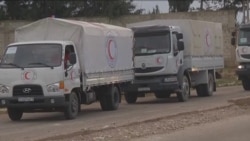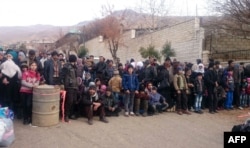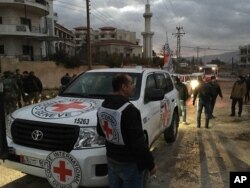The United Nations Security Council is to hold an emergency meeting Friday and will likely demand all sides in Syria end the sieges of towns where thousands of civilians are starving to death.
Britain, France and the United States asked for the emergency session. The diplomats will be briefed by aid workers who were able to make deliveries of food and medicine this week for the first time in months.
An angry U.N. Secretary-General Ban Ki-moon Thursday reminded all those involved in the Syrian civil war that using starvation as a weapon is a war crime.
“All sides — including the Syrian government, which has the primary responsibility to protect Syrians — are committing atrocious acts prohibited under international humanitarian law,” he said.
Misery, heartbreak, starvation
In a speech to U.N. member states, Ban drew a heartbreaking picture of misery in the rebel-controlled towns of Foua and Kfarya, and the town of Madaya — also under rebel siege and blockaded by Syrian forces.
“U.N. teams have witnessed scenes that haunt the soul,” the U.N. chief told reporters. “The elderly and children, men and women, who were little more than skin and bones: gaunt, severely malnourished, so weak they could barely walk, and utterly desperate for the slightest morsel.”
"I would say that they are being held hostage, but this is even worse. Hostages get fed,” he added.
The International Committee of the Red Cross said Thursday that another round of aid deliveries to the three towns appeared to be going smoothly.
“Three Syrian Arab Red Crescent, ICRC and U.N. cars entered at 1500 local time” into Madaya, ICRC Director of Operations Dominik Stillhart told reporters at the United Nations.
He said 44 trucks brought mainly wheat flour and some hygienic items to the government-blockaded town. A nutritionist also was accompanying the convoy to better assess the levels of malnutrition. The town of 42,000 received its last aid delivery in mid-October.
Tears of joy
“According to ICRC team that entered Madaya, the people were very happy, even crying, when they realized that wheat flour is on the way,” Stillhart said.
Stillhart said a convoy of 17 trucks with the same materials was simultaneously heading for the rebel-held towns of Foua and Kefraya. He said eight of the 17 vehicles had already been cleared at checkpoints there.
The aid agencies plan to deliver fuel this Sunday to the three towns
U.N.'s Ban warned that civilians must not be left in jeopardy of further suffering if cease-fires break down and sieges resume.
“They too, have a right to assistance, a right to dignity and a right to food,” he said.
Stillhart added that the U.N. is working to quickly get medical teams and mobile clinics on the ground in those towns.
Peace talks
In December, the U.N. Security Council — long divided over Syria — agreed to talks between the Syrian government and moderate rebels. Russia, the United States and United Nations will lead the talks, scheduled for January 25 in Geneva.
The secretary-general urged the warring parties to build on that political momentum and not let “regional tensions derail our quest to end this war.”
He acknowledged there are “still big differences” of positions between the parties, but he said he hoped they would show their solidarity, flexibility and a sense of compromise.
“We have to first, and most of all, we have to think about the future of the Syrian people,” Ban said.







